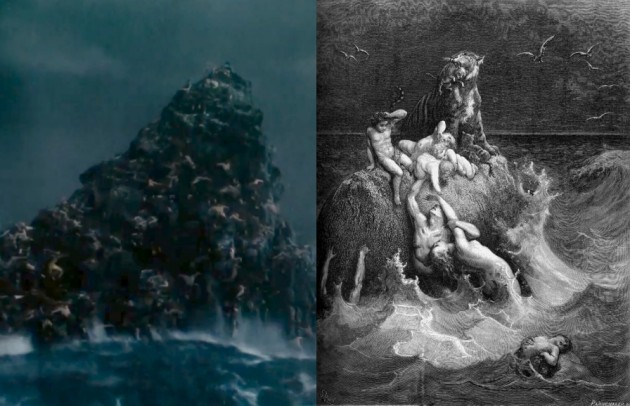December 26 saw the opening of Ridley Scott’s $140-million Moses epic Exodus: Gods and Kings. As cumbersome as its video game-friendly title, the film is occasionally spectacular but mostly stodgy, not to mention camp in the way that only a very, very serious endeavour can be. Closer in spirit to Scott’s own Gladiator (2000) and Kingdom of Heaven (2005) than to Cecil B. De Mille’s two treatments of the same material (1923 and 1956), Exodus capped an unusually busy year for the Old Testament on screen.
While the first and likely most profitable Biblical film of 2014 was a New Testament adaptation, Son of God (a cheapskate re-edit of the 2013 television series The Bible that raked in $60 million at the US box office but has yet to reach these shores), the most interesting were those that sought inspiration from further back. Drawing upon the Book of Genesis and the Book of Job, respectively, Darren Aronofsky’s Noah (below) and Andrey Zvyagintsev’s Leviathan (above) were, in very different ways, two of the most striking cinema releases of the past year.
In anticipation of the release of Exodus: Gods and Kings, Scott promised that his film would be for the faithless as much as the faithful – a claim that smacked of the financial necessity for such a pricey property to be all things to all people, as much as any theological revisionism. The challenge of adapting a religious text for a potentially secular audience was met more seriously by Aronofsky, whose Noah managed to baffle believers and non-believers alike, in large part because – while it was deeply flawed in many respects – it defied the most basic expectation, namely that it be a “Biblical” story at all.
Noah is far from Aronofsky’s most finessed film – that would be Black Swan (2010) – but it is his most intriguing, its uneasy agnosticism proving harder to shake than either the glib nihilism of Requiem for a Dream (2000) or the hokey mysticism of The Fountain (2006). It’s also his most radical, taking the genuinely daring step of presenting scriptural material as a piece of science fiction, without specific religious affiliation. While Paramount’s marketing campaign paid lip-service to lucrative “faith audiences” by describing Noah’s subject as “the most remarkable event in our history”, the filmitself is purposely obscure as to its temporal and even spatial setting. Numbered among its bravura sequences are two history-spanning time-lapse montages, one splitting the difference between Darwinism and “intelligent design”, the other suggesting that the period in which Noah is set may be read as the far future as much as the distant past.
It’s no coincidence that the accompanying 2011 graphic novel developed by Aronofsky with Ari Handel and Niko Henrichon is subtitled “For the Cruelty of Man”, because Noah’s most intelligible message is not scriptural but environmental. Indeed, the film’s emphasis on the value of non-human life seems all the more refreshing revisited in the wake of Christopher Nolan’s overblown Interstellar, with its suggestion that Earth’s sole “purpose” is to be the cradle of homo sapiens. Noah also offered some of the most indelible large-screen images of last year, including a breathtakingly realised flood sequence that directly quotes Gustav Doré’s 19th-century woodcuts to outstrip any other screen apocalypse of the CGI era. A bracingly odd mixture of scriptural fidelity and disregard, the film treated its source material with no more or less reverence than any other literary adaptation – a statement that has considerable power in itself. Noah believed in some kind of God, but it could not believe in His benevolence.
Striking images of a different kind appeared in Zvyagintsev’s Leviathan, from a bleached whale skeleton on a desolate beach to the year’s most powerful closing shot (no spoilers here). However, while Noah’s narrative is best described as scrappy, Leviathan has an almost novelistic breadth and depth befitting a film that draws, at least in part, from what Tennyson called “the greatest poem of ancient and modern times”. The first poetic book in the Old Testament, the Book of Job is generally regarded as being the literary zenith of the Bible, a quality that offsets its simple enquiry: “Why do the righteous suffer?” Zvyagintsev’s film transplants this question to contemporary Russia, focusing on Kolya (Aleksey Serebryakov), a man who faces the weight of a corrupt legal and political system when he attempts to prevent his coastal property from being requisitioned by the local mayor (Roman Madyanov, in the year’s most memorably grotesque characterisation).
Kolya’s misfortunes – anticipated and unforeseen – mount, over the course of Leviathan,to the point that he begins to resemble a present-day incarnation of Job. However, while Job eventually comes to an acceptance, if not an understanding, of God’s will, Kolya rails against his fate until he is comprehensively broken down by a society in which every instrument of power, not least organised religion, is stacked against him. While the God of Noah speaks through dreams and visions, the will of God in Leviathan is communicated through a corrupt priesthood, whose venality becomes clear by the film’s end.
Zvyagintsev describes himself as a Christian, and the distance between Leviathan’s scriptural referent and its actual narrative is sufficient to dispel the suggestion of sacrilege around Kolya’s status as a secular martyr. However, the film does directly contrast the inscrutable caprices of the Old Testament God – which are also addressed in Noah – with the rather more transparent, but no less irresistible, whims of a self-interested earthbound elite. As such, Leviathan represents, like Noah, a bold approach to the use of the Bible as “source material” for film.
While Exodus: Gods and Kings languishes in an expensive no-man’s-land between scriptural fidelity and comic book history, both Noah and Leviathan offer vital new approaches to putting the Old Testament on film – the former by extracting and adapting the scriptural narrative to new ends, the latter by creating a new narrative that interrogates scriptural instruction, and its contemporary interpretation. Neither is a Biblical film, as such, but both raise the question of how compelling new kinds of film narrative might result from an approach to the good book that eschews bland reverence – or rejection – in favour of more open-ended types of engagement. In a genuinely secular cinema, there is no reason why the Bible can’t have its own second coming. David Turpin
Exodus: Gods and Kings is in cinemas now. Noah is available on DVD from Paramount. Leviathan will be released on DVD on March 9, through Artificial Eye.







